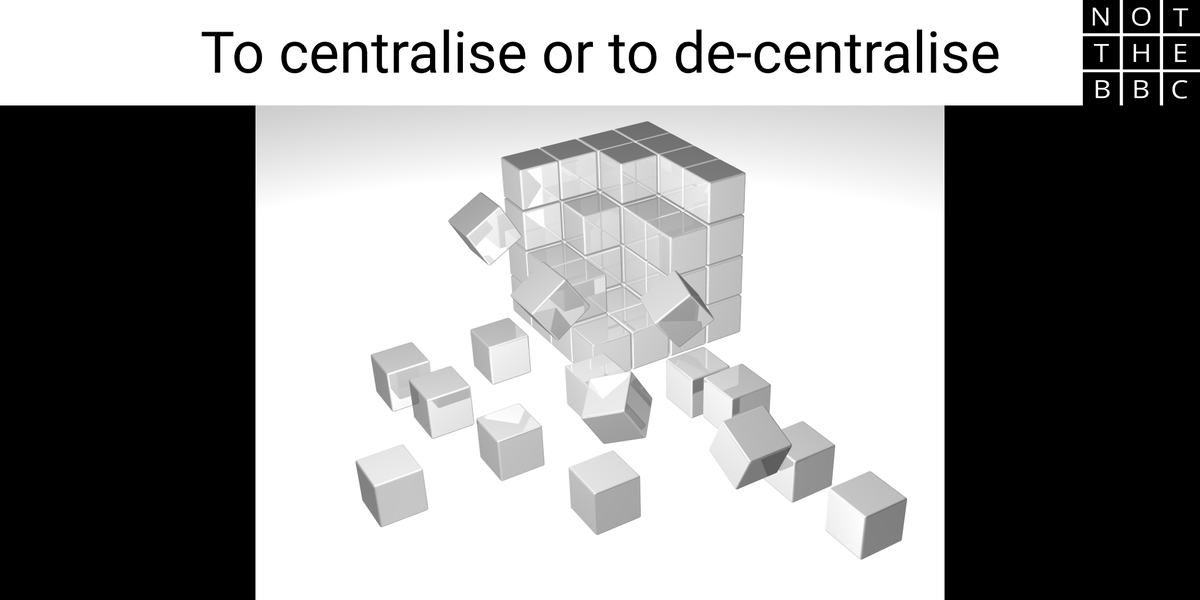META-TAKE: To centralise or to de-centralise.
I thought for a long time we were in a battle between nationalism and globalism.
I no longer see things this way.
I thought for a long time we were in a battle between nationalism and globalism.
I no longer see things this way.
To centralise or to de-centralise. That is the question.
For a long time I thought we were in a struggle between nationalism and globalism.
But just like 'Right vs Left', I now believe that dichotomy to be outdated.
For a long time I thought we were in a struggle between nationalism and globalism.
But just like 'Right vs Left', I now believe that dichotomy to be outdated.
The internet and globalisation have changed the world irreversibly, taking us close to global consciousness.
Many people now identify more with like minds across the world than with their compatriots.
Many people now identify more with like minds across the world than with their compatriots.
This isn't something you turn back from, and is something that will persist for as long as the internet sticks around.
Global identity makes the nation-state untenable: democracy cannot work if you do not identify with your fellow voters.
Global identity makes the nation-state untenable: democracy cannot work if you do not identify with your fellow voters.
I recognised this fact a while back, but saw the horrifying prospect of global government and kept to my position as a nationalist.
But this was to get stuck in the nationalism vs globalism dichotomy.
But this was to get stuck in the nationalism vs globalism dichotomy.
Global identity doesn't have to lead to global government. You can have global consciousness and local governance, you just need to do away with the state (at least in its existing form).
The important principle underlying nationalism is sovereignty, not the nation-state per-se.
The important principle underlying nationalism is sovereignty, not the nation-state per-se.
Once you break free from the national government-global government lens, it becomes clear that the battle is about centralisation vs de-centralisation.
The internet, artificial intelligence and globalisation have lowered the marginal cost of production significantly, making previously unimaginable fortunes possible for global capitalists.
Financiers, global conglomerates, media companies and big tech are all profiting wildly from scale.
Their cronies in the political establishment, by extension, are too.
Their cronies in the political establishment, by extension, are too.
This explains why they formed such a potent coalition against Trump, whose nationalist (de-centralising) platform was a threat to their attempts to concentrate global wealth and power.
In the True Believer, Eric Hoffer talks about how the industrial revolution was a revolution of the rich: "the breathtaking potentialities of mechanisation set the minds of manufacturers and merchants on fire".
I believe today's oligarchs are similarly aflame between the ears.
I believe today's oligarchs are similarly aflame between the ears.
Neo-feudalism beckons.
Or at least it would, if it weren't for the emergence of de-centralising technology such as the blockchain.
Combined with the internet and AI, this amounts to a technology stack making de-centralisation possible like never before.
Or at least it would, if it weren't for the emergence of de-centralising technology such as the blockchain.
Combined with the internet and AI, this amounts to a technology stack making de-centralisation possible like never before.
While the costs of operating at large scale are lower than ever, so are the costs of operating at small scale.
Artificial intelligence can do the job of the working classes, but it can also do the job of the managers and the bureaucrats.
Artificial intelligence can do the job of the working classes, but it can also do the job of the managers and the bureaucrats.
De-centralised finance, logistics and governance are becoming feasible.
While elites may no longer need us, we no longer need them.
While elites may no longer need us, we no longer need them.
This is the basis for the power struggle, and it explains why our political classes are so bought into globalism: they see their waning relevance and are latching onto the nearest form of managerial control.
This is something that @clim8resistance, put very well in my recent podcast with him.
The mutual insecurity and power hunger of big tech, big media, big capitalism and big government creates a natural alliance around centralising the world into a large corporatist state.
The mutual insecurity and power hunger of big tech, big media, big capitalism and big government creates a natural alliance around centralising the world into a large corporatist state.
This enables the political class to retain its relevance, and the global capitalists to put down the competition via regulation.
Indeed, the response to Covid and climate change can be understood in this light.
Indeed, the response to Covid and climate change can be understood in this light.
Both are being sold as global problems which purportedly show we need globalised solutions.
Team centralisation are trying to tell us they're still relevant - we need centralised co-ordination to manage the spread of viruses, to roll out vaccination programmes, and to cut emissions - while doing their bit to wipe out the small man via lockdowns with convenient…
…definitions of 'essential business', and increase reliance on the state via furlough (soon to be universal basic income) in the process.
I believe we can also expect to see a rise in World War rhetoric over the next few years as part of this drive, as defense is one of the biggest arguments for centralised rule.
We've got to resist; the neo-feudal world will be a two-tier system, with a small number of powerful elites and a large underclass of docile corporate slaves and welfare recipients.
Freedom will be restricted in order to prevent breakaways.
Freedom will be restricted in order to prevent breakaways.
So while they blast their propaganda, we've got to hold our nerve and work towards de-centralisation.

 Read on Twitter
Read on Twitter


